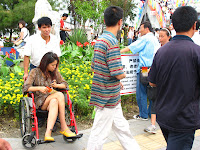 Published 2 Feb 2008 for CNN.com. Click here for link.
Published 2 Feb 2008 for CNN.com. Click here for link.
BEIJING, China (CNN) -- Peter Wu is brimming with pride. "Have I told you that I'm a father now?" asks the 35-year-old Beijing resident. "My wife just gave birth to a baby girl!"
The baby is a timely addition to Peter's family, not least because they are faced with the pending demolition of their home, which is located along the narrow alleyways of one of Beijing's ancient hutongs. Peter says the compensation he was set to receive from property developers for his 20-square-meter house would have been about $1,170 per square meter.
But a new member in the family changes the equation.
"Now that my baby's arrived, they'd have to compensate me enough to buy a three-bedroom apartment," says Peter, who went by a false name for this interview.
Peter is among thousands of families in the path of China's rapid redevelopment. Under the country's compensation system for claiming their property, officials consider not only the size of the house, but also the size of the household, according to an expert.
"There are many factors governing the compensation payment offered to private owners in the case of an expropriation," explains Wang Yi, Professor of Law at Renmin University of China. "But in both cases, the number of people living in the household is indeed an important factor when considering compensation payment."
As China grows and prepares for the 2008 Olympics, older neighborhoods are making way for new sports facilities, luxury shopping complexes and residential areas. Between 40,000 to 50,000 households a year have been relocated during the past few years as part of the Chinese capital's redevelopment program, according to Sui Zhenjiang, director of Beijing's construction committee. However, a report by the Geneva-based Centre on Housing Rights and Evictions puts that number at 1.5 million.
Real estate prices have skyrocketed. The cost of new homes increased 42 percent -- from $821 per square meter to $1,169 -- between 2004 and 2006, according to a report published by Web site Sina.com and New Real Estate Magazine. As the capital's real estate prices climb, more residents are refusing to move due to what they see as low levels of compensation being offered to them. There have been protests in cities-- and rural areas -- across the country with accusations of illegal land grabs and unfair compensation.
"I'm not moving," says the owner of a small convenience store inside the narrow alleys of Dacaochang Hutong, right behind Wangfujing Grand Hotel. "With the amount of money they are offering, you can perhaps get something outside the fifth ring road. [But] there is no way I can buy my own place anywhere within the city."
Rewards for resettlement
Peter now waits to see if the arrival of his baby girl will boost his chance of higher compensation. "It is commonly known that even with the same property size, a household with five members is definitely entitled to a larger compensation than a household with just two members," Peter says.
"With five people in the family, the compensation would have to be enough to buy a two- or three-bedroom property. A family with just two people only needs a one-bedroom apartment. You can't pay the same amount of compensation to all families."
For others, it is more than a matter of compensation. There is also the question of history. In Beijing's narrow alleys -- or hutongs -- where Peter's home is located, residents look upon their neighborhoods with pride, an aesthetic dating as far back as the 13th century. They say the hutongs helped shape the capital's character and now ask: "at what price new development?"
With skyscrapers rising around them, residents of these old Beijing quarters still go about their daily routines as demolition looms: old men chat over a game of chess in the middle of the alley; second-hand traders haggle over the price of old electrical goods; and pet owners take their dogs out for a walk.
The only thing that is visibly out of place in this pleasant neighborhood is the eviction posters plastered on gray brick walls at every turn. The meaning behind the posters is loud and clear: "7 Days." That's the countdown to the deadline for early relocation rewards. Those who choose to move out before the deadline will be entitled to a $7,314 reward. The award matters little to Peter; he says he would not accept the money.
"The amount is too low. It would have to be at least $6,648 per square meter. Or else, we're not budging. We're sitting on prime land!"
 The outer perimeters of the stadium is also a good place to source for innovative entrepreneurs and performers. These guys in the picture are advertising their own hands-free binoculars. Interested? You can buy one off them and watch the games from the furthest seat in the stadium. Hands-free.
The outer perimeters of the stadium is also a good place to source for innovative entrepreneurs and performers. These guys in the picture are advertising their own hands-free binoculars. Interested? You can buy one off them and watch the games from the furthest seat in the stadium. Hands-free. But then again, not everyone gets their promotional strategies correct. This 'handicapped' lady obviously didn't pay much attention in her Acting 101 class. With her legs crossed and sitting on a wheelchair, can we not tell what is wrong...or right...with her? If you can cross your legs, lady, you can definitely do the moonwalk. Sympathy points out the window.
But then again, not everyone gets their promotional strategies correct. This 'handicapped' lady obviously didn't pay much attention in her Acting 101 class. With her legs crossed and sitting on a wheelchair, can we not tell what is wrong...or right...with her? If you can cross your legs, lady, you can definitely do the moonwalk. Sympathy points out the window.
